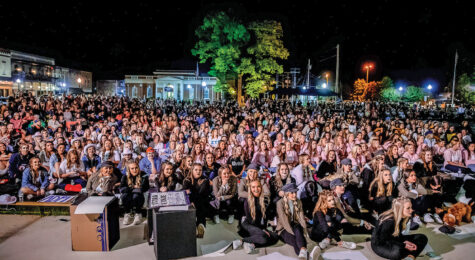Fiber, Fuel and Flight: The Chattanooga Region is LEED-ing the Pack for Sustainability
Discover the three arenas where the Chattanooga Region is shaping the future of sustainability.
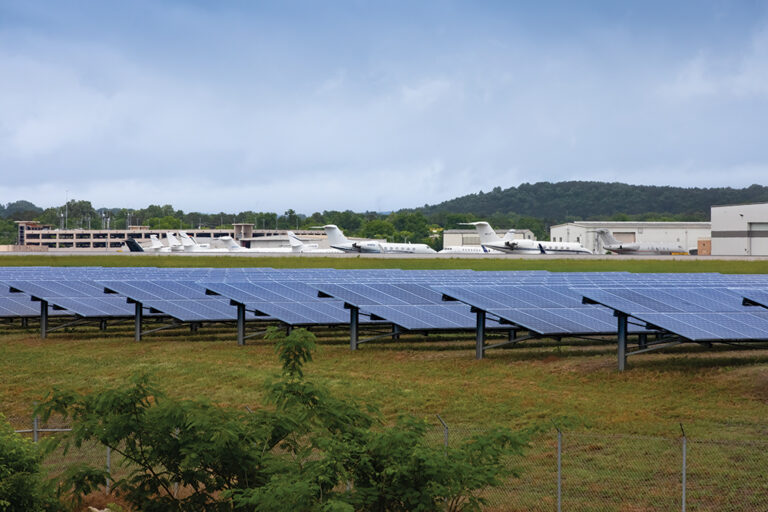
At first glance, LEED (Leadership in Energy and Environmental Design) certification might seem like a narrow thing: a third-party certification program for designing, constructing and operating high-performance green buildings.
Look below the surface, however, and you’ll find that green building touches many vital areas for the health and well-being of individuals, companies and communities. Several companies and nonprofits in Greater Chattanooga are using LEED certification to shape the future of sustainability.
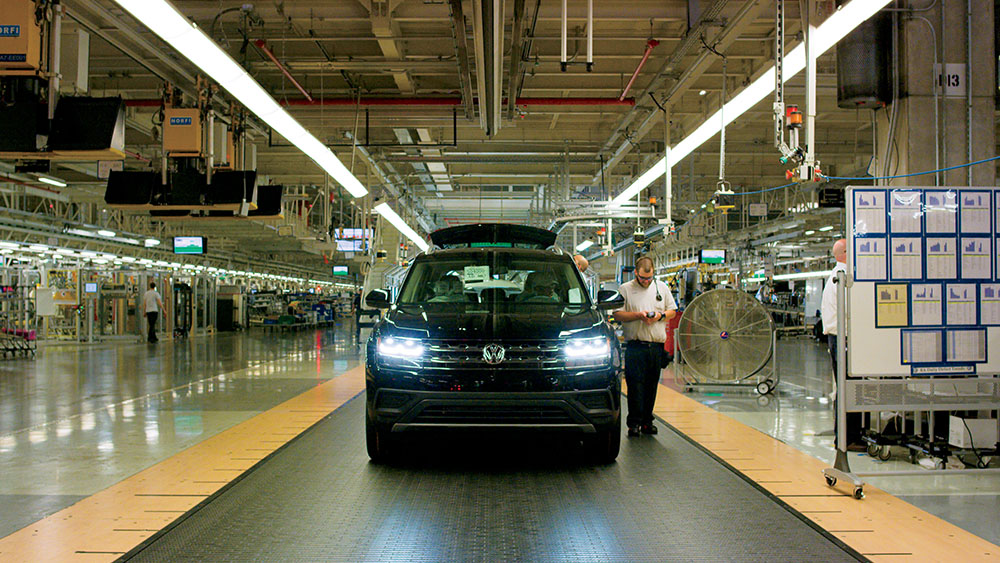
In This Article
EPB’S Smart Grid
While LEED certification recognizes the sustainability of buildings, another certification called PEER (Performance Excellence in Electricity Renewal) does the same thing for electric grids. That includes Chattanooga’s Smart Grid operated by utility EPB, which received PEER Gold certification in January 2022. The Smart Grid had already received PEER certification in 2015. Upgrading to PEER Gold certification means that EPB’s electric grid is the most resilient and renewable-ready electric grid in the U.S.
“PEER Gold certification helps EPB dream big when it comes to sustainability,” says Elizabeth Hammitt, EPB’s director of residential energy and environmental solutions. “Because our grid is 100% fiber optic and can handle a substantial number of renewables and electric vehicles, we don’t have to be limited by our infrastructure when we’re thinking about green technology and clean technology.”
PEER certification also means that companies in EPB’s service area can earn extra points toward LEED certification for their green development projects.
Volkswagen is the first Chattanooga company to take advantage of this LEED boost. VW’s Chattanooga factory became the world’s first LEED Platinum certified automotive manufacturing plant in 2012; now, the company is integrating EPB’s PEER Gold designation into a new battery engineering lab in Chattanooga. The $22 million, 32,000-square foot facility opened in June 2022, signaling exciting momentum for the electric vehicle industry.
Fueling Innovation
Chattanooga is now Volkswagen’s North American base for manufacturing electric vehicles. The original manufacturing facility expanded to allow the production of the ID.4 compact electric SUV — whose first year of production sold out before manufacturing began — and to create a facility to assemble battery packs.
The new battery engineering lab brings battery testing and validation closer to U.S. vehicle production in Chattanooga, rather than where it used to occur in VW labs in Germany and China.
“This effort is part of Volkswagen’s commitment to establishing more environmentally sustainable facilities in Chattanooga, where we will add comprehensive battery know-how and the localized production of electric vehicles, shaping Volkswagen’s electric future in America,” says Wolfgang Maluche, vice president at Volkswagen’s engineering and planning center in Chattanooga.
Meanwhile, Australia-based NOVONIX is beginning to manufacture synthetic graphite — a key ingredient in electric vehicle batteries — in Chattanooga. The company is investing $160 million to convert a former nuclear turbine manufacturing facility on Chattanooga’s riverfront to create North America’s first factory for this critical EV battery component.
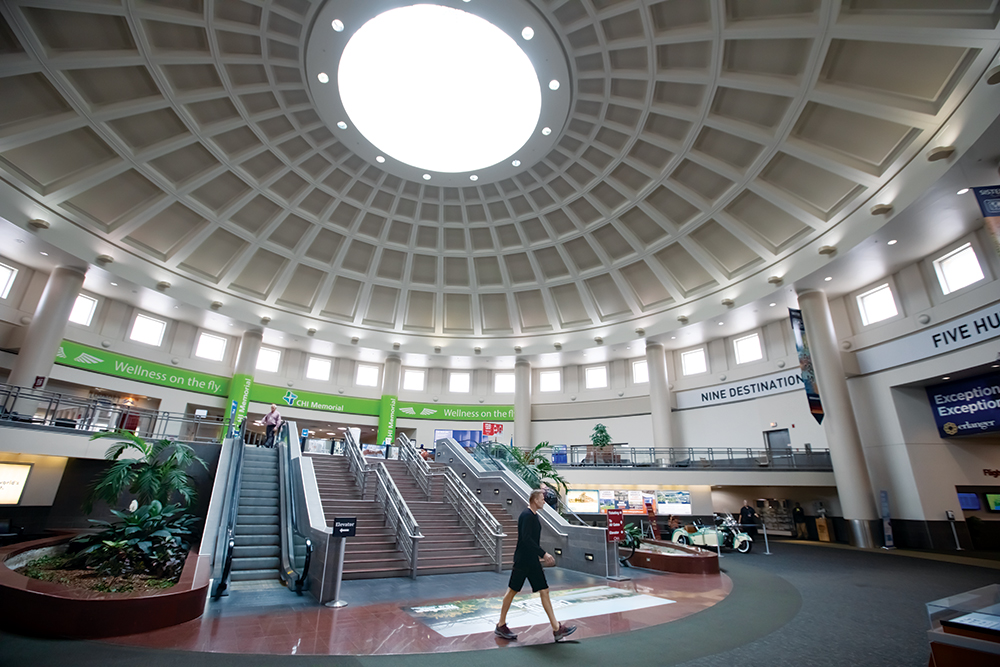
Fully Solar Airport
The Chattanooga Airport began working to reduce its environmental footprint a decade ago. Over time, it incorporated this green philosophy into larger projects, including a solar farm and LEED-designed facilities. Now, it boasts two major sustainability accolades: the first aviation terminal in the world to be LEED Platinum certified and the first airport in the U.S. to produce 100% of the electricity it uses annually. That’s why Newsweek presented the Chattanooga Airport with the Future of Travel award in 2021.
“The Chattanooga Airport’s sustainability efforts reinforce our commitment to the environment and the betterment of our community,” says Blake Poole, vice president of air service and economic development. “We are dedicated to achieving the highest level of sustainability in all our projects to minimize our overall footprint.”
The airport is now undertaking a two-year, $28 million passenger terminal expansion, its biggest in more than 30 years. As a reminder of its values, the airport displays a 3-D printed Climbs Sculpture, created by Chattanooga-based Branch Technology to show visitors the relationship between innovation and natural resources in Chattanooga.

Seeing the Light
Local organization helps companies be environmentally responsible.
Companies wanting to reduce waste, improve their energy usage and cut costs can get much help by contacting a Chattanooga-based nonprofit called green|spaces.
Green|spaces was founded in 2007 to support large and small businesses interested in reducing their environmental impact. The nonprofit organization offers incentive campaigns, education/technical training classes, design advice to businesses, and meets with commercial and residential builders to encourage and educate them on making construction less wasteful and more environmentally responsible. The influence of green|spaces has resulted in 43 LEED building projects in Chattanooga, 60 “BetterBuilt” green homes, 10 green roofs and 17 photovoltaic solar array installations.
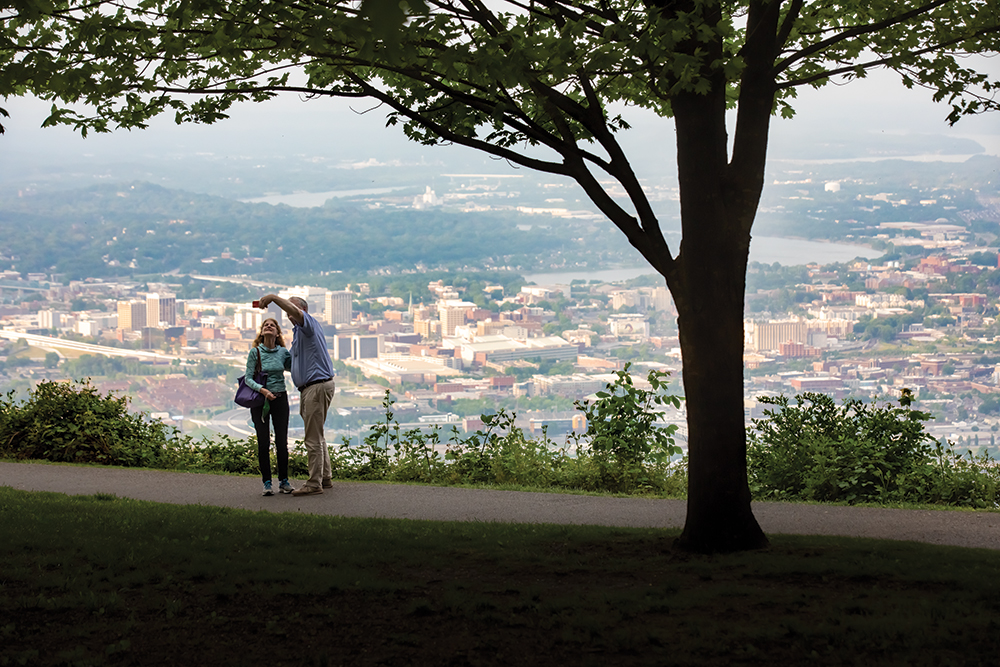
In Balance
A collaborative partnership helps protect the region’s natural resources.
Sustainability means balancing priorities – economic activity, nature, community – that all too easily come into conflict.
Founded in 2012, Thrive Regional Partnership is a collaborative organization that unites people in the 16-county Greater Chattanooga region where Tennessee, Georgia and Alabama meet to preserve community and natural character for generations to come.
Thrive’s Natural Treasures Alliance is a collective of organizations and individuals that works to ensure a legacy of the region’s landscape, including its natural, scenic and nature-based cultural and recreational assets, as well as the places that sustain people across the region with wholesome food, renewable forests, clean air and fresh water.
Focus areas for the alliance include protecting wildlife and the habitat it needs to flourish, increasing outdoor recreation assets, promoting working farms and forestlands and safeguarding and expanding iconic cultural and historic landmarks and scenic vistas.
“Amid all of this resplendent beauty, our people garner spiritual sustenance, solace and the calm reassurance that accompanies and abides a deeply held sense of place,” says Denny Mobbs, a Thrive trustee.
If you’d like to learn more about the Greater Chattanooga area, check out the latest edition of Chattanooga Region Economic Development.

